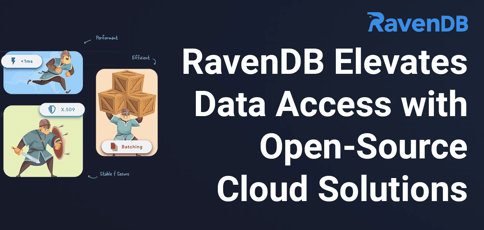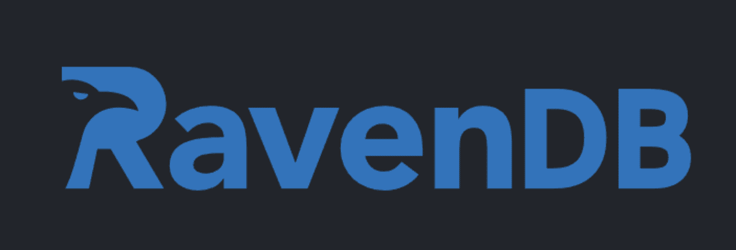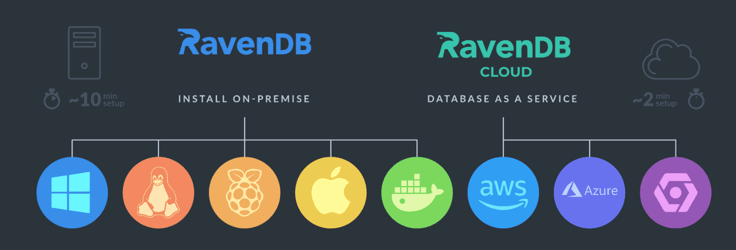
TL; DR: If you’ve ever experienced the frustration of downloading a file on your computer only to struggle to locate it moments later, you’re not alone. Now just picture this challenge on a larger scale — it happens every day to everyone, from startups to large enterprises. And it’s not slowing down because 90% of today’s data has been generated in just the past two years. RavenDB addresses this data management dilemma as an open-source, NoSQL solution leveraging cloud technology that streamlines the handling of vast amounts of data. Dejan Milicic, Developer Advocate with RavenDB, told us how the platform aims to provide scalable solutions to simplify the complexities faced by businesses dealing with the exponential growth of information.
Data management is everywhere: Almost every business, regardless of size or industry, relies on data management to organize, store, and analyze their data. It permeates industries, influences decision-making, and shapes how organizations operate in the digital age.
In 2022, surveyed businesses said their most significant data management challenges were the number of data silos, lack of data governance, and data quality issues. Those same businesses agreed that purchasing the right software tool positively impacted their data management implementation.
Even on a smaller scale, most of us understand that the role of technology in overcoming these challenges can’t be overstated. And, as organizations strive to harness the power of their data, the data management industry continues to evolve. That’s where solutions like RavenDB come in.

“The whole spirit of RavenDB is in the spirit of being open-source,” said Dejan Milicic, a Developer Advocate at RavenDB. “Whether it’s sharing, contribution, or external input — over the years, we’ve had so many people who aren’t officially affiliated with us contribute to the project.”
RavenDB is an open-source ACID document-oriented database that relies on its supportive community. It is written in the C# programming language and works on Windows, Linux, and Mac OS as a NoSQL implementation for easy setup and implementation. NoSQL allows RavenDB to avoid a fixed schema so that users can have better flexibility with their data structures.
Meet RavenDB, an Open-Source NoSQL Database Solution
RavenDB calls itself “the boring database.” But this is with some cheeky intent because by no means does that mean it’s lacking. The company believes databases should function as tools that operate in the background without demanding attention from the user.
Since RavenDB operates in a schema-less environment, RavenDB allows for dynamic modifications to an organization’s data structure, making it better suited for handling large volumes of data and applications.
The key distinction is its scalability. While SQL databases usually opt for vertical scaling, usually by increasing existing hardware power, NoSQL databases use horizontal scaling. This involves adding more servers to the database to accommodate the growing demand for data and user activity.
At a glance, some of the benefits of using a NoSQL database like RavenDB include:
- Adaptability: Effortlessly accommodate various data types without a fixed structure
- Scalability: Excel at managing large datasets for dynamic applications
- Flexibility: NoSQL databases handle changing data types without issue, which is ideal for real-time applications such as financial trading platforms, social media feeds, gaming leaderboards, and IoT (Internet of Things) networks
- Reliability: Data distribution ensures availability even if specific components fail since it can distribute the workload across multiple servers
“This database is reactive,” Dejan explained, referring to the system’s understanding of the users’ typical actions. “When you open your settings, you have more than 100 parameters — but you rarely enter them because it’s able to tweak them based on your operational behaviors.”
SMBs Need Flexible, Scalable Cloud Solutions
With its NoSQL, open-source database design, RavenDB embraces the cloud era — among the most beneficial options for small and medium-sized businesses (SMBs) and startups.
RavenDB is a DaaS (database as a service), which allows for quick setup and scalability, making it perfect for SMBs and startups on a budget.
Most of us aren’t strangers to the cloud. You probably use it for everyday tasks, whether launching an app or backing up your phone. But for SMBs, the cloud is a scalable solution, and combined with a DaaS like RavenDB, startups get the best of both worlds when it comes to a flexible and cost-effective infrastructure.

“You can run a startup on a tight budget for infrastructure because web hosting is affordable,” explained Dejan. “In 5 to 10 minutes, you can log in, set up a cloud account, and start a container. The initial cost for this cluster is in double-digit dollars, but you can launch and manage a startup without breaking the bank.”
With the cloud’s inherent accessibility, startups using RavenDB’s DaaS can seamlessly navigate the challenges of tight budgets and resource constraints. The pay-as-you-go model minimizes financial barriers, allowing entrepreneurs to allocate resources judiciously and focus on core business operations.
(But if you’re with RavenDB for the long haul, don’t worry: You can also pay annually.)
It’s Time to Modernize Database Solutions
Traditional databases were born in the 1970s and 1980s for predictable environments. But over the years, as the landscape has transformed, modern businesses face more challenges, including managing unprecedented data volumes and diverse data types.
“Relational databases are still the primary choice for decision-makers and developers, but when you think about what it was like back then, it was much more predictable,” Dejan explained.
The ’90s brought a paradigm shift and introduced semi-structured and unstructured data types. Dejan said traditional databases were optimized for writing rather than reading, which posed efficiency problems.
“Innovation isn’t something new — so sometimes just switching your technology stack or trying something else could be this innovation everyone is bragging about,” Dejan laughed.
Recognizing the limitations of relational databases in the face of modern challenges, businesses are exploring alternative solutions for improved scalability and adaptability.
Recently, RavenDB released Version 6.0, which introduced sharding. Sharding has been a highly requested functionality for its ability to handle large-scale data, allowing users to run large databases easily and inexpensively.
That said, RavenDB is gearing up for a new future.
“The database isn’t just a single point in the organization — so the more interoperability and fine-tuning we provide, the better of a team player our database becomes,” said Dejan. “We’re working on making RavenDB compatible with various systems, including Snowflake, RabbitmQ, and ODBC integrations.”
This way, Dejan emphasized, RavenDB isn’t just a database but a vital support in your organization’s ecosystem. Start or try RavenDB for free today.



